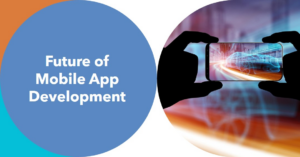Introduction:
As technology continues to evolve at a rapid pace, the landscape of mobile app development is constantly evolving, presenting new opportunities and challenges for developers and businesses alike. In 2024, we anticipate several emerging trends that will shape the future of mobile app development, enabling developers to create innovative and immersive experiences that meet the evolving needs and preferences of users. In this guide, we’ll explore the key mobile app development trends expected to dominate in 2024 and beyond.

1. Augmented Reality (AR) and Virtual Reality (VR) Integration:
The integration of augmented reality (AR) and virtual reality (VR) technologies into mobile apps is poised to revolutionize user experiences across various industries. AR and VR offer immersive and interactive experiences that blur the lines between the physical and digital worlds, allowing users to engage with content in new and exciting ways. From retail and gaming to healthcare and education, mobile apps leveraging AR and VR capabilities will provide users with immersive storytelling, virtual shopping experiences, interactive training simulations, and more, driving engagement and differentiation in the crowded app market.
2. AI-Powered Personalization and Recommendations:
Artificial intelligence (AI) and machine learning (ML) algorithms are becoming increasingly sophisticated, enabling mobile apps to deliver personalized and contextual experiences tailored to each user’s preferences and behavior. In 2024, we expect to see a surge in AI-powered personalization and recommendation engines embedded within mobile apps, providing users with tailored content, product recommendations, and services based on their past interactions, demographics, and real-time context. AI-driven personalization not only enhances user engagement and satisfaction but also drives conversion rates and customer loyalty, making it a key differentiator for app developers and businesses.
3. Progressive Web Apps (PWAs) for Cross-Platform Compatibility:
Progressive web apps (PWAs) are web-based applications that offer the functionality of native mobile apps while leveraging the power of the web. In 2024, we anticipate a growing adoption of PWAs among developers seeking to deliver seamless and consistent experiences across various devices and platforms. PWAs offer benefits such as offline access, push notifications, and fast load times, making them ideal for businesses looking to reach users across different devices and operating systems without the need for separate native apps. With the continued advancement of web technologies, PWAs will play an increasingly prominent role in the mobile app development landscape.
4. Voice-Enabled Interfaces and Conversational AI:
The rise of voice-enabled interfaces and conversational AI is reshaping the way users interact with mobile apps, enabling hands-free and natural language interactions for tasks such as search, navigation, and transactional activities. In 2024, we expect to see a proliferation of voice-enabled mobile apps leveraging technologies like natural language processing (NLP) and voice recognition to provide users with personalized assistance and seamless conversational experiences. From virtual assistants and voice-controlled smart home devices to voice-enabled shopping and customer support, mobile apps integrating voice technology will offer users greater convenience, accessibility, and efficiency in their daily lives.
5. Enhanced Security and Privacy Measures:
With the increasing concerns around data privacy and security, mobile app developers are prioritizing the implementation of robust security measures to protect users’ sensitive information and maintain trust. In 2024, we anticipate a focus on enhancing security and privacy features within mobile apps, such as biometric authentication, data encryption, and permission controls. Developers will also need to comply with evolving regulatory requirements and industry standards to ensure the protection of user data and mitigate the risk of data breaches or privacy violations. By prioritizing security and privacy, mobile apps can build trust with users and safeguard their digital identities and personal information.
6. Edge Computing for Improved Performance and Latency:
Edge computing is a distributed computing paradigm that brings computation and data storage closer to the location where it is needed, reducing latency and improving performance for mobile apps. In 2024, we expect to see an increased adoption of edge computing technologies among mobile app developers looking to deliver faster and more responsive experiences to users. By offloading computation and processing tasks to edge servers located closer to the user’s device, mobile apps can minimize latency and deliver real-time data processing and analysis for applications such as gaming, IoT, and augmented reality, enhancing user experiences and enabling new use cases.
Conclusion:
The year 2024 promises to be an exciting time for mobile app development, with emerging technologies and trends reshaping the landscape and opening up new possibilities for developers and businesses. From augmented reality and AI-powered personalization to progressive web apps and voice-enabled interfaces, the mobile app development trends outlined in this guide offer a glimpse into the future of mobile experiences. By embracing these trends and leveraging innovative technologies, developers can create immersive, personalized, and secure mobile apps that meet the evolving needs and expectations of users in an increasingly digital world.
As you navigate the ever-changing mobile app development landscape, stay curious, adaptive, and forward-thinking, exploring new technologies and strategies to create compelling and impactful experiences for your users. By staying ahead of the curve and embracing emerging trends, you can position your mobile apps for success and drive meaningful engagement, loyalty, and growth in 2024 and beyond.



